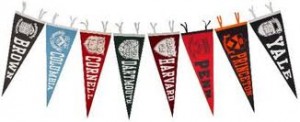
When I talk to parents and listen to their stories about college prep, it’s hard not to be concerned. I’m concerned because it seems that college choice has become a competition–a competition among parents and a competition among students. It’s all about the prestige, the name, and the rankings and very little about the fit.
I recently participated in a discussion thread on the Grown and Flown Facebook page. A mother was concerned that her daughter was only considering applying to the Ivies. I tried to insert my advice on the matter and was attacked by so many parents whose students were either applying to these colleges or attending them. I was simply trying to point out that these colleges aren’t the “be all and end all” of colleges and there are so many other options out there to consider. Shame on me for disparaging these top-ranked universities.
Seriously though, it surprises me how many parents feel that their student can’t be happy at an unknown college or university. It astounds me how many parents will allow their student to attend one of these colleges and either go into debt themselves or allow their student to accumulate mounds of debt; because, news flash—these colleges only provide need-based aid to the poorest of families and merit aid to the best of the applicant pool. Your student may be accepted but offered no financial assistance.
How do you steer your student away from the these colleges?
If your student is a top candidate for an Ivy league college and you are willing to pay for it, then by all means, she should apply. But if you’re worried about finances or know that your student is applying for all the wrong reasons, it’s time to steer them away from these colleges.
The best way to do this is to draw the focus away from the Ivies and toward other colleges that offer the same benefits at a greater return for your investment. Encourage your student to visit colleges, talk to alumni, connect online with students from other colleges and start a conversation.
How do you find those “diamonds in the rough” colleges?
You can start by looking at the College That Change Lives website. Then move toward College Navigator and fill in some criteria that fits your student’s interests: location, size, major, merit awards, etc.. Look at the stats, financial aid awards, and student debt. After you have a list, do some digging. What is your student interested in studying? Is there a student body better suited for her? If she is at the top of the applicant pool will she have a better chance of winning merit aid?
How do you change your (and your student’s) mindset?
Visit. Interact. Start a dialogue with other colleges. Once your student sees the virtual cornucopia of colleges out there, it will be easier for you to move her toward the colleges that are a better fit. Once she realizes that it’s not about the name, but about the fit, it will be easier to add those colleges that fit instead of choosing one simply based on name or ranking.
With over 4000 colleges and universities in this country, it will serve you and your student better if you look at some of the lesser known colleges and examine their benefits. As my daughter did, she found her perfect match when she moved beyond the college with the ranking to the college that was a better fit for her academically, socially, and financially.

